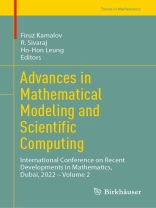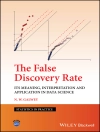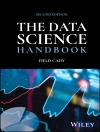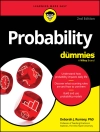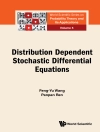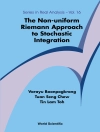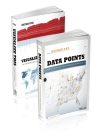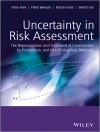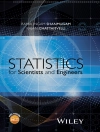This volume collects the proceedings of the International Conference on Recent Developments in Mathematics (ICRDM), held at Canadian University Dubai, UAE, in August 2022. This is the second of two volumes, with this volume focusing on more applied topics, particularly mathematical modeling and scientific computing, and the first covering recent advances in algebra and analysis. Each chapter identifies existing research problems, the techniques needed to solve them, and a thorough analysis of the obtained results. Advances in Mathematical Modeling and Scientific Computing will appeal to a range of postgraduate students, researchers, and industry professionals interested in exploring recent advancements in applied mathematics.
Inhaltsverzeichnis
PART 1 – Differential Equations: High-Precision Algorithms For Fredholm Integral Equations (Awawdeh).- A new decay estimate for a weakly dissipative viscoelastic suspension bridge (Al-Gharablic).- Existence and uniqueness of Renormalized solution to non-coercive elliptic problem with measure data (Ou´edraogo).- Fixed-Point Theorems Based Evaluation of Analytical Solution in Fractional Diffusion Equations (Malathi).- Control and Synchronization of a Modified Chaotic Finance System with Integer and Non-Integer Orders (Moaddy).- Dutch Book Methods for difference and differential equations (Gandolfi).- Fourier modes in fluid flow and energy cascade (Afanasyeva).- Approximate solutions of third order time fractional dispersive equations with singular and non singular kernel derivatives (Raghavendar).- Choosing between vaccine efficacy and vaccine price: mathematical model for COVID19 (Al-arydah).- Classification of Cosmological Wormhole Solutions in the Framework of General Relativity (Al-Ali).- Use of Technology and Software in Mathematics Education (Jain).- Modified VIM for the Solutions of Gas Dynamics (Fatima).-
PART 2 – Mechanics: Nanofluid containing motile gyrotactic microorganisms squeezed between parallel disks (Umavathi).- Linear model for two layer porous bed suspended with nano sized particles (Umavathi).- Effect of Variable Viscosity on Magnetohydrodynamics Mixed Convection Flow from a Vertical Flat Plate (Ajaykumar).- Line effects in the Darcy-B´enard instability in a rotating anisotropic porous layer saturated with a fluid of variable viscosity (Suthar).- Soret and Dufour Effects on Radiative MHD Thermosolutal Viscoplastic Nanofluid Mixed convective Flow Past a Bidirectional Stretching Sheet (Venkatadri).- Influence of Slip Velocity on an Infinite Cylinder and Rough Flat Plate lubricated with couple stress fluid (Sreekala).- Simulation of MHD Quadratic Natural Convection Flow of Nanofluid Inside a Square Enclosure with Thermal Radiation Effect (Venkatadri).- Combined Effects of Magnetic Field and Heat Source on Double Diffusive Marangoni Convection in Fluid-Porous Structure (Manjunatha).- Peristalsis and Taylor Dispersion of Solute in the Flow of Casson Fluid (Nagarani).- An Aligned Magnetic field effect on Unsteady Heat and Mass Transfer Flow of non-Newtonian Fluid through Porous Medium (Maheshbabu).-
Effect of viscosity variation and slip velocity on the squeeze film characteristics between a cylinder and a plane plate with couple stress fluid (Salma).- Turbulence Generators and Turbulence Structure (Selvam).- Conjugate buoyant convection of nanoliquids in a porous saturated annulus (Arokiaraj).- The characteristic of squeeze film due to Impact of couple stress and MHD on curved annular circular plates (Nair).- An Exact Analytical Solution Marangoni Boundary Layer Flow with Heat and Mass Transfer (Hatami).- Hybrid Nanofluid Flow and Thermal Transport Analysis in a Linearly Heated Cylindrical Annulus (Sankar).- Influence of non-similar heating on nanofluid buoyant convection of nanofluid in a tilted porous parallelogrammic geometry (Sankar).- Buoyant Convection of Nanofluid in an annular domain with linearly heating (Girish).- Thermal and entropy management of nanoliquid in a discretely heated inclined square geometry (Kumara Swamy).- Linear and Non-linear Analysis of Unicellular Rayleigh-B´enard Magneto Convection in a Micropolar Fluid Occupying Enclosures (Jestine).- Study uf Rayleigh – Bénard – Marangoni Convention in a Microfliud with Corirlos Force (Baby).- Performance of magnetic dipole contribution on ferromagnetic heat and mass transfer flow with the influence of non-linear radiative heat flux (Venkatadri).- Thermogravitational Convective Flow inside a Cavity with a Heated Circular Cylinder: A Finite Difference Analysis via Vorticity Stream Function Approach (Venkatadri).- An Unsteady Flow of Fluid Velocity, Temperature and Heat Emission on Mhd Free Convection Flow of Some Nanofuids (Ramesh Babu)
Finite Element Analysis of Unsteady Dispersion in Casson Fluid Flow (Nagarani).- Thermosolutal Convection in a Tilted Porous Parallelogrammic Enclosure with Discrete Heating and Salting (Sankar).- An application of generalized Fourier and Fick’s law over a different non Newtonian fluid (Padmavathi).- Micropolar nanofluid enfolded with viscous fluid: Three layer flow Operation Research Production inventory model for three levels of production with defective items, shortages including multi delivery policy (Karthikeyan).- Accomplishment Expedients Of Batch Arrival Queuing Model by Fuzzy Ordering approach (Ramesh).- Analysis of a M[x]/G/1 retrial queue with Secondary optional Service subject to Bernoulli Vacation, Server Breakdown and Customer Baulking (Indhira).- Solving Neutrosophic Bi-objective Assignment Problem using Different Approaches (Anuradha).- Analysis of Attainment Estimates of Loss System Queue (Seenivasan).- Performance scrutinity of an M/G/1 Retrial Queue with Two-Phase Service and Preemptive Resume under Working Vacations and Working Breakdowns (Indhira).- Models of Goal Programming & R Programming to Earmark Acreage (Shalini).- Neutral- Bipolar Fuzzy Sets and its Applications (Rosline).- Critical path in an intuitionistic triangular fuzzy number for Time Cost Trade Off in project network by the modified traditional method (Deepa).- Operations on Alternate Quadra – Submerging Polar (AQSP) Fuzzy Graphs and its Applications (Rosline).- Optimal Solution for Transportation Problems using Trapezoidal Fuzzy Numbers (Boobalan).- Heterogeneous Queueing Model with Intermittently Obtainable Server with Feedback (Indhira).- An Economic order quantity inventory model for the food supply chain with waste minimization based on a circular economy (Karthikeyan).- Achievement Estimations of Priority Queue System in Fuzzy Environment (Seenivasan).- Poisson jumps and state-dependent delay in a sequential approximation of stochastic neutral partial integro-differential systems (Pradeepa).- A hybrid genetic algorithm based linear programming model to optimize feed cost for Indian Ruminants: With Stochastic Model in Comparison (Kuntal).-
PART 3 – Statistics: Outlier Detection using the Range Distribution Dania Dallah and Hana Sulieman (Dallah).- Presenting a flexible class of INAR(p) models to analyze the COVID-19 series in Mauritius (Youssef).- Prediction of Social Status on Depression by using Logistic Regression (Karthikeyan).- Single Working Vacation Queue, Server Failure With Appearance of Backup Server (Seenivasan).- Exploring ARIMA models with interacted lagged variables for forecasting (Dhandra).- A Novel Hybrid Model for Time Series Forecasting Using Artificial Neural Networks and Autoregressive Integrated Moving Average Models (Baskaran).-
PART 4 – Graph Theory Sigma chromatic number of Mycielski transformation of graphs (Balamurugan).- Bipartite Decomposition of Graphs using Chromatic Number (Karthika).- Degree-Based Topological Indices and QSPR Analysis of Some Drugs Used in the Treatment of Dengue (Balamurugan).- Orientation Number of Two Complete Bipartite Graphs with Linkages (Rajasekaran).- Packing Chromatic Number of Windmill related Graphs (Santiago).- Complementary triple connected total domination number of a graph (Mahadevan).- Pebbling Number and 2-Pebbling property for the Middle Graphs of the graph obtained from fan graph by deleting f independent Edges (Dhivviyanandam).- The De Brunn Graoh Ofsequential Repetition of Patterns in DNA Strings (Fong).- Independent Domination Number of Cyclic and Acyclic Graphs (Balamurugan).- Computation of Complete Partite- Zumkeller Graphs (Balamurugan).- Characterizations of (gamma(i), gamma(DDS), gamma(DSNS)) – Trees (Yamuna).- Mobius Cordial Labeling of Graphs (Balamurugan).- Selfipendant and Extremal Pendant Graphs (Kottarathil).-
PART 5 – Mathematical Education : Computing the CD-number of Strong product of graphs (Mahadevan).- Detection of TCC-Domination number for some product related graphs (Mahadevan).- Learners’ Mental Constructions in Learning Circle Geometry (Brijlall).- N – Separation Axioms in Topological Spaces (Alsalem).- Investigating how the Activity, Classroom Discussion, and Exercise (ACE)Teaching Cycle influences Learners’ Problem-Solving and achievement in Circle Geometry (Brijlal).- Exploring possible teacher and learner support structures to improve learner Mathematics performance (Brijlal).- A study of Mathematical Epidemiology Model of Dengue Spread with fractional Properties (Jain).
Über den Autor
Firuz Kamalov is an associate professor of mathematics at Canadian University Dubai, UAE. He received his Ph D at University Nebraska – Lincoln in 2011, where he was an Othmer Fellow. His research interests include functional analysis, applied mathematics, statistical learning, and time series forecasting. He is the managing editor of Gulf Journal of Mathematics and an associate editor of Journal of Intelligent and Fuzzy Systems. Dr Kamalov is a recipient of multiple research grants totalling over USD 1 million.
R Sivaraj is working as an Associate Professor in the Department of Mathematics, Dr B R Ambedkar National Institute of Technology, Jalandhar, Punjab, India. He has published 55 manuscripts in SCI/SCOPUS indexed journals which includes several Q1/Q2 journals. He has served as a Guest Editor for several journals and book series including The European Physical Journal Special Topics, Trends in Mathematics, Lecture Notes in Mechanical Engineering, and AIP Conference Proceedings. He has published a book in Chapman and Hall/CRC, New York. He has organized several international conferences and workshops to promote research in India and UAE.
Ho Hon Leung is an associate professor at UAE University. He received his Ph D in mathematics from Cornell University in 2011 and his BSc from Imperial College London in 2006. His research interests lie in the intersections of geometry, algebra and combinatorics. He is also interested in fluid dynamics and mathematics education.
